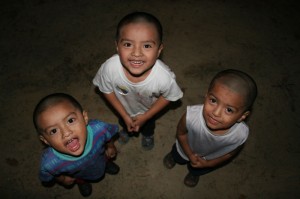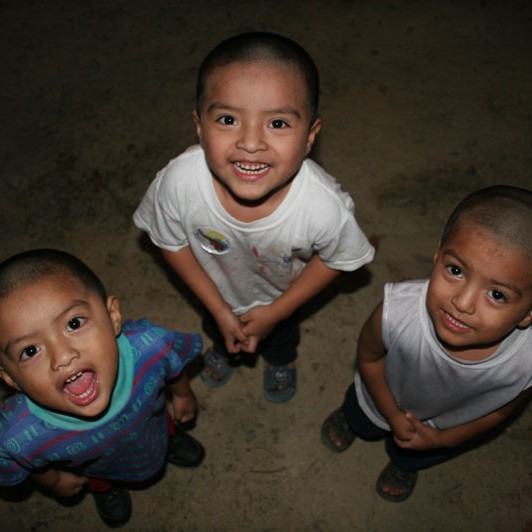
Last week, while senators in Washington indicated their overwhelming support for the Farm Bill through a preliminary floor vote, farmworker families throughout the Southeastern U.S. toiled long hours in the summer heat. After 14-hour days in the fields, many farmworkers return home pesticide-ridden, underpaid and empty-handed — financially unable to provide adequate food for themselves and the hungry mouths that await them.
What many don’t know about the hotly-debated “Agriculture Reform, Food, and Jobs Act of 2012,” commonly referred to as the Farm Bill, is that more than 80% of the bill’s funding goes to nutritional programs. One such program is SNAP, or the Supplemental Nutrition Assistance Program (formerly known as food stamps). This bill would slash $4.5 billion in funding from SNAP over the next ten years.
SNAP has faced a bad rap in recent years, but Dottie Rosenbaum, a senior policy analyst at the Center on Budget and Policy Priorities, thinks much of the criticism has been exaggerated: “In my view, one of the biggest myths is the claim that some people make that SNAP is growing out of control and is contributing in a substantive way to the deficit,” she says. “To the extent it is growing, it’s for reasons that we very much understand — it’s about addressing the needs of people in a bad economy.”[1]
According to the Congressional Budget Office, this cut would result in an estimated $90 less a month on average for groceries for those families who are in need of assistance.[2]
What’s not being said is how these cuts, combined with a recent amendment to the bill, would impact farmworker families in particular. The amendment, proposed by Sen. Jeff Sessions (R-Ala), the ranking member of the Senate Budget Committee, would require that every person in a household show proof of citizenship before anyone in the home applies for SNAP.[3]
This means that if just one member of a household does not have proper identification, no one in the family is eligible for SNAP.
Both multigenerational families living under one roof and Latinos in mixed status families–those including a parent who is undocumented or is a legal permanent resident but not yet eligible for benefits — would suffer. This would inordinately affect Latino children who would otherwise be eligible for the program but more than half of whom have at least one immigrant parent.
During an interview with MSNBC’s Al Sharpton on Thursday evening, Sen. Kirsten Gillibrand (D-N.Y.) argued against Sen. Sessions’ amendment, referring to the first book of the New Testament: “In Matthew 25, the first question Christ asks on Judgement Day is, ‘Did you feed the poor?’ It’s unacceptable that we have Republican advocates who are saying it’s immoral to support food stamps.”[4]
Flashback to North Carolina: A recent article from Toxic Free NC notes that “according to recent data, nearly half of farmworker families in NC don’t have enough food to put on the table. It’s no wonder. Most farm workers are exempt from minimum wage laws, and all are exempt from overtime pay. Typical pay for harvesting sweet potatoes in NC is 40¢ per bucket, which means that a worker has to pick and haul two tons of sweet potatoes, bucket by bucket, to earn just $50.”[5]
At a time when we should be investing in nourishing our youth, Washington is threatening to strip away many children’s only means to a meal. When we should be investing in improving access to programs like SNAP, Congress is on its way to turning more kids away hungry, adding an estimated 4.5 million Latino children alone to the already 16 million children who are at risk of hunger in the U.S.
Sen. Sessions’ proposed amendment to the Farm Bill is just the latest in a string of political and economic policies that have reduced food security among farmworker families.
According to a report issued by the Food Chain Workers Alliance released the day following the Senate’s preliminary floor vote, “More than 86 percent of workers reported earning subminimum, poverty, and low wages, resulting in a sad irony: food workers face higher levels of food insecurity, or the inability to afford to eat, than the rest of the U.S. workforce.”[6]
And as César Chávez pointed out decades ago, “It is ironic that those who till the soil, cultivate and harvest the fruits, vegetables, and other foods that fill your tables with abundance have nothing left for themselves.”
Senators are expected to cast their final votes on the Farm Bill and pending amendments next week.
TAKE ACTION against the amendment which attempts to deny an estimated 4.5 million Latino children access to food stamps, follow the link below:
“16 Million Hungry Children in America is Apparently Not Enough” | NCLR
To access the new report highlighting farmworker food insecurities as a PDF, click the links below or refer to the article to request hard copies:
- “The Hands That Feed Us: Challenges and Opportunities For Workers Along The Food Chain.” | The Food Chain Workers Alliance | full report
- Executive summary
- Executive summary en español
For articles and more information related to the Farm Bill, check out these links below:
- “Why The Farm Bill’s Provisions Will Matter To You” | NPR | June 13, 2012
- “Big Cuts to Food Stamps Loom in Farm Bill, but Gillibrand Vows Fight” | US News and World Report | June 7, 2012
- “Kirsten Gillibrand Fires Back At Jeff Sessions’ Food Stamp Argument” | The Huffington Post | June 14, 2012
— Daryn Lane, Student Action With Farmworkers Intern
[1] Neuman, Scott. “Why The Farm Bill’s Provisions Will Matter To You.” NPR. NPR, 13 June 2012. Web. 14 June 2012.
[2] Fox, Lauren. “Big Cuts to Food Stamps Loom in Farm Bill, But Gillibrand Vows Fight.” US News. U.S. News & World Report, 07 June 2012. Web. 15 June 2012. <http://www.usnews.com/news/articles/2012/06/07/big-cuts-to-food-stamps-loom-in-farm-bill-but-gillibrand-vows-fight>.
[3] Elba Arroyo, Liany. “Latino Children Shouldn’t Be A Political Piñata.” Web log post. National Council of La Raza. National Council of La Raza, 13 June 2012. Web. 14 June 2012. <http://www.nclr.org/index.php/about_us/news/blog/latino_children_shouldnt_be_a_political_pinata/>.
[4] Reilly, Mollie. “The Huffington Post.” The Huffington Post. TheHuffingtonPost.com, 14 June 2012. Web. 15 June 2012. <http://www.huffingtonpost.com/2012/06/14/kirsten-gillibrand-jeff-sessions-food-stamps_n_1598631.html>.
[5] Duncan Pardo, Ana. “Foodies For Dignity: How You Can Honor Farmworkers This Harvest Season.” Web log post. Toxic Free NC. N.p., n.d. Web. 14 June 2012. <http://www.toxicfreenc.org/informed/winter10/foodiesfordignity.html>.
[6] The Hands That Feed Us: Challenges and Opportunities for Workers Along the Food Chain. Rep. Farmworker Advocacy Network, 8 June 2012. Web. http://www.ncfan.org/research/2012/6/8/the-hands-that-feed-us-challenges-and-opportunities-for-work.html.

